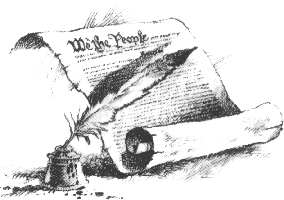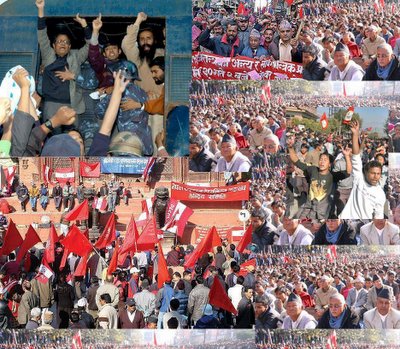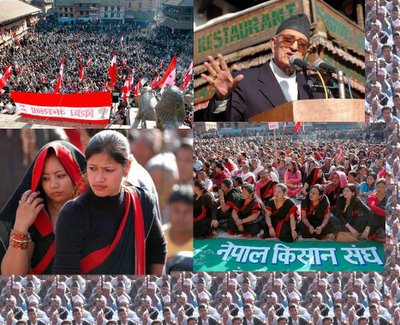
Maoists renew threat to disrupt municipal polls, unilateral ceasefire as good as ‘withdrawn’ NepalNews ..... the CPN (Maoist) will mobilise masses, organise mass meetings and coordinate their programmes of protess with that of the seven party opposition alliance.
Their three month long ceasefire was and is their most brilliant military move to date. I can't see another such example of a similar incident on the world stage or in world history. No armed group with such a large presence, geographically and politically, over such a large portion of a national territory has ever made such a move, not that I know of. The Maoists have already made history.
They also moved from a communist republic to a democratic republic. I am not aware of such an ideological U turn anywhere in world history either.
Nepal has seen much violence this past decade, especially the past few years after King Gyanendra decided to go down the path of royal adventurism. More than 12,000 deaths, and over 23,000 suicides: those are the numbers. The royal army is responsible for about 75% of both.
The Maoists have been accused of senseless violence. And I for one have never approved of their violent ways. But if they are a rebel outfit that has acted inhuman and irrespponsible, the royal army is supposed to be the state. They can not act inhuman and irresponsible, but they have.
The royal army and the militarism it symbolizes have been blamed for one Nagarkot incident of 11 deaths. I think it should be held responsible for (12,000 + 23,000)/11 * 75% = 2,386 Nagarkots.
One option would be to put both the royal army and the Maoist army under the microcope and subject them to a country tribunal. For that the Democrats would have to militarily take over the country and bring both to justice through use of force. This option does not go with the ground realities.
Recently Kul Chandra Gautam suggested another option which is pretty much standard. He said forgiveness comes second. First there has to be some book keeping. A Truth and Reconciliation Commission has to be set up that will allow people who have lost much to the war to come forth and get their stories documented. But that is after peace and democracy.
I think a general amensty is the price the country has to be willing to pay for permanent peace. So the total emphasis has to be to help the Maoists become yet another political party within a multi-party framework.
But the king is stuck in third gear. He has no intention of reciprocating the ceasefire. If he had acted reasonable and reciprocated the ceasefire, we would have had the luxury to think he seeks reconciliation.
Instead he is hellbent on proving his points.
- The Maoists can be militarily crushed.
- The 1990 constitution is the final constitution Nepal will get.
- His use of Article 127 can not be questioned. All he has done have been valid.
- Citizens' rights are gifts from the king. When he takes them away, the citizenry should not act surprised. When he gives them back, the people should be thankful.
If the Maoists are truly republicans, they should not be surprised the king did not reciprocate the ceasefire. Kings are not supposed to be reasonable and democratic.
Instead the Maoists should continue with their ceasefire, and take further steps to consolidate their peaceful, democratic base, and engage the seven party alliance in further trust building. The 12 point agreement needs much polishing still. (10 Point Agreement To Succeed 12 Point Agreement) The idea should be to use the announced February 8 polls to engineer a total bipolarization in the country. The seven party alliance, the Maoists, and the CMDP (Citizens Movement for Democracy and Peace) have to come together in a solid way.
I think the Maoists have the Sinn Fein option. Keep your military wing intact for now. And have a separate political wing. Do not break the ceasefire, but engage in a major peaceful mobilization of the masses through the peaceful, political wing.
Breaking the ceasefire will take all positive developments back to square one. But a major peaceful mobilization will build upon the continued ceasefire.
To expect the king to take the lead would not be republican thinking. So his not reciprocating the ceasefire should not be held against the country and its population.
The monarchy and the Nepali Congress are on downward slopes for their own reasons. The monarchy is not willing to get out of the way even to a ceremonial form. The Nepali Congress is playing foul games with its sister organization the Nepal Students Union. A NSU that elects Gagan Thapa and is led by him would be somewhere at the forefront of this democracy movement and would be one piece of good news for an otherwise downward moving party. Gagan would be good for the NSU, the movement and for the Nepali Congress. But the NC leaders do not seem to realize this.
The king is the same way. He does not feel the groundswell. He does not feel the noose tightening around him. He wants all or nothing. Monarchs don't cut deals, I guess. The king's regime seems to be on autopilot. I think Tulsi Giri should speak publicly more often. That would really help the democracy movement. Because otherwise the democrats do not seem to realize this regime does not intend to understand democracy.
The Maoists need to come around to this:
2. The seven parties and the Maoists are committed to a constituent assembly elections to which will be held by an interim government functioning under an interim constitution that will make the interim prime minister the Commander In Chief of the army. Before the Maoists are invited to join the interim government, the two armies in the country are to be integrated through external mediation. If the integration not be total, foreign aid is to be sought to integrate the rest of the Maoist armed cadres into the economy. It is hoped that the integrated army will be downsized by the government that will come into power after a new parliament takes shape. The seven parties agree that the 1990 constitution is dead, and so is the 1999 House that can not exist outside the 1990 constitution. As to how to get to the interim government, a decisive movement is to be waged across the country. That might result in the king coming around to the idea of an interim government, in which case the question of monarchy will still be an issue in the constituent assembly. On the other hand, if the king be relentlessly uncompromising, the movement ends the monarchy before it forms the interim government, in which case the question of monarchy will not be an issue in the constituent assembly. It has been agreed that People’s power is the only alternative to meet the goals. This has been suggested as the interim constitution: Proposed Constitution.
And they should contiue with the ceasefire, and engage in some major peaceful mobilizations.
In The News
Maoists kill two civilians; abduct 400 NepalNews
Maoists pledge cooperation with int’l agencies
Nepali version of Linux ‘NepaLinux’ launched
Maoists renew threat to disrupt municipal polls, unilateral ceasefire as good as ‘withdrawn’
RPP dissidents call for early general convention
Nepal Maoists declare all-out war on elections Times of India, India
Nepal parties vow to thwart municipal elections
Nepal parties vow to thwart municipal elections Reuters
Nepal Maoists heal rift with UN NewKerala.com, India
UN welcomes Nepali guerrilla's adherence to BOG
NC, UML leaders discuss further protests Kantipur
Maoists kill 2 civilians; abduct 400: RNA
OHCHR for impartial investigation into Nagarkot shootout
NC-D leaders catch up with Maoist leaders
Maoists declare programmes to disrupt municipal polls
Giri's remarks draw flak; parties to obstruct polls at any cost
RPP rebel faction issues ultimatum for special convention














